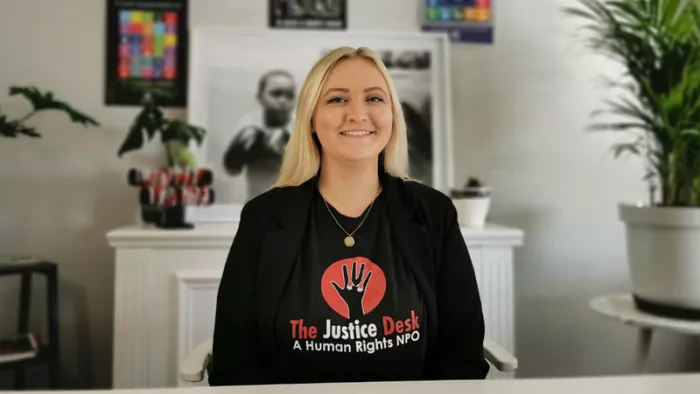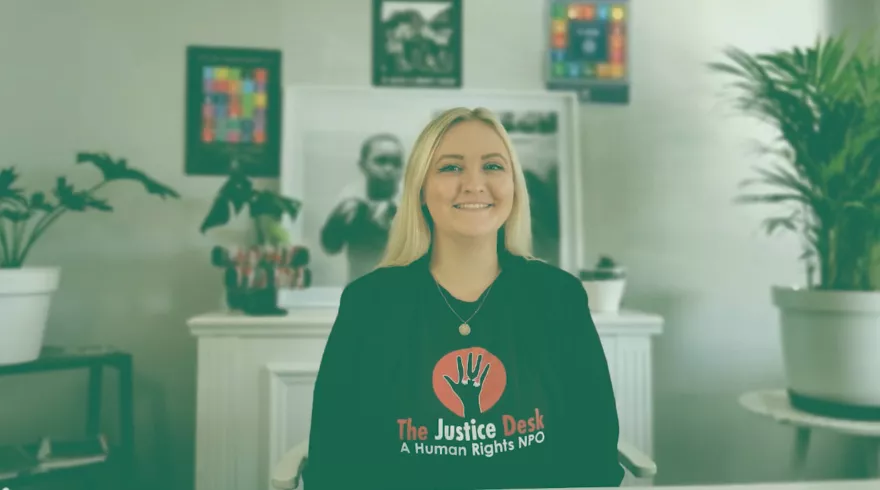
Change maker: Brave (Jessica)
Jessica Dewhurst, Justice Desk / South Africa
My name is Jessica Dewhurst and I am the founder and CEO of an award-winning human rights organisation called The Justice Desk. We fight for fundamental human rights and empower every activist across South Africa, Zambia and Zimbabwe. I have been named Start Network's Change Maker in the Brave category.
I started working in the justice world when I was fourteen years old. I grew up in an incredible country called South Africa and I was born in 1992, which was two years before the end of apartheid. Apartheid was an incredibly unjust system; we had a government without anyone of colour, which elevated and gave opportunities to people who were white. So I grew up kind of on the verge of apartheid being abolished.
I grew up when it was called the "Rainbow Nation" where we are all equal and free. Finally people of colour were able to vote and have rights and things like that, and it sounded really great. I love the whole idea of it, but it wasn’t what I was seeing in the country, it wasn’t what I was seeing in the communities. Still the majority of opportunities (good jobs, quality education) are still mostly afforded to the white population in South Africa. The most poverty stricken, the people who do not have access to fundamental human rights, who live in township communities without access to quality education, water, or safety, were still predominantly people of colour in my country.
And so as a young person, I really rebelled against it. I was hearing all of these awesome things about us as a country and just not believing that any of it was true. So I started working at a non-profit organisation where we provide help for kids who were infected with HIV/Aids, refugee kids, and survivors of physical, sexual, and emotional abuse.
We took the kids camping and they would have an amazing time. We gave them real meals and they had so much fun. They could be kids again and I loved it, but the more I worked there, the more I realised it was the same kids that kept coming to camp and we weren’t actually solving an issues.
We weren’t fixing any problems. We were putting plasters on wounds, but we were not asking why these kids have to come to this camp in the first place. So for me, I started to really focus on how to make sure that we empower these young people in these families, in these communities, so that they don’t have to come to camps like this and they don’t have to rely on non-profit organisations. For me, if I truly believed in fundamental human rights, and that means that my brothers and sisters are equal, then they shouldn’t have to have to enter this type of service in the first place.
I recognised that being a white South African came with a lot of privileges, and I wanted to do something with that privilege. So we started The Justice Desk, which focuses on empowering, educating and equipping everyday people to be human right defenders. We work in communities where we would educate, train, and upskill everyday people, not just the lawyers and social workers and humanitarians. We want to to take human rights and laws that no one can really understand unless you have a PhD and make them real in the lives of people who actually need it in grassroots communities.
We do advocacy and lobbying at both national and international levels. We do training and education in multiple communities across a few countries, and we do community empowerment programmes, which mentor local community members who are trying to address a particular issue. We have three of those programmes currently: one is called the Mbokodo club, which stands for "The Rock Club". The slogan is "wathint’abafazi wathint’imbokodo" which stands for "you strike a woman, you strike a rock" and that programme is for girl survivors of rape and gender-based violence for the mother capital of South Africa which is Yanda.
South Africa is experiencing femicide; the amount of women and girls who are murdered here on a daily basis is equal that of countries at war. We are not at war with another country, but men have declared war on women, on girls and children in South Africa. So to address gender-based violence and to support these young girls who are survivors, we have an incredible programme that teaches self-defence, boxing and fitness, but also female empowerment, confidence-building and entrepreneurial skills. It also covers sexual health rights, as well as mental health care and support. They are incredible leaders who are going out there to change the world.
We also have another project which is called "Ntsika yeThemba" for young boys. South Africa is known as the 'fatherless nation' because many don’t have fathers like others do, and we have a very toxic culture of toxic masculinity in the country. So the project for young boys is about redefining what it means to be a man. It's for young men who choose not to be abusers and instead be protectors who choose to build up women, stand up for their rights and build a better equal society.
The third project is our youth ambassadors programme. We are in forty schools across the countries, and have 18 ambassadors who we train and equip to become leaders and change makers in their schools and communities. They are doing things like catching human traffickers and abolishing the tampon tax, as well as convincing parents and community leaders to end child marriage and send their girls to school. These are all kids under the age of 18, they are so incredible.
So it's all about the everyday person—why they are so important and loved and valued. Every single person deserves to lead their own change and live an empowered life where they are respected and that's what we try to do at The Justice Desk. We are a small team and we are only in three countries for now, but we will grow and continue to hopefully reach more people, led by the people who have come out of all of these projects.
One of the major changes that I would like to see is leaders and community members not being prevented from holding positions of power and leadership. A lot of the time, we have external people come into the community and tell them what's wrong. I’m completely against that. I believe that the true experts in the community are the community itself, What we need to do is empower, equip and support those community members to lead their own change, to be the ones spearheading that humanitarian work, to be the ones making decisions and not external people making decisions on behalf of community members. So the big shift I would like to see is more emphasis placed on building trust and respect with those who are the true experts in what the issues are.
This article is based on an interview conducted by A Good Day in Africa. Listen to the full interview below.

